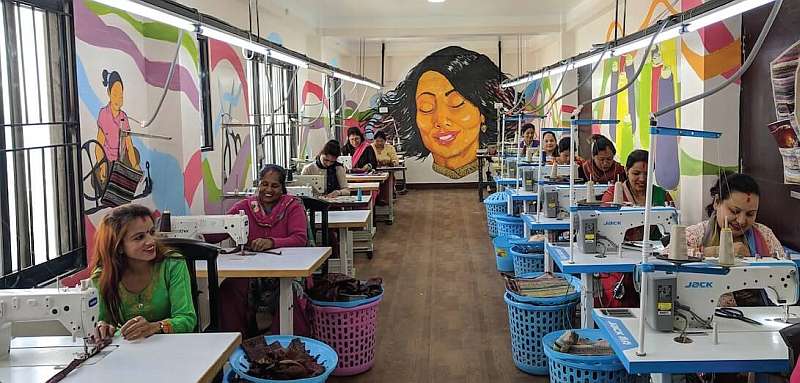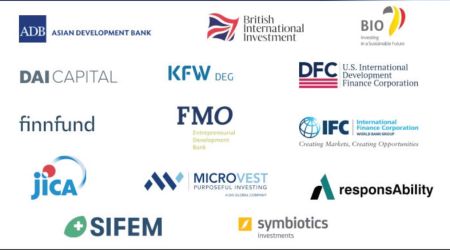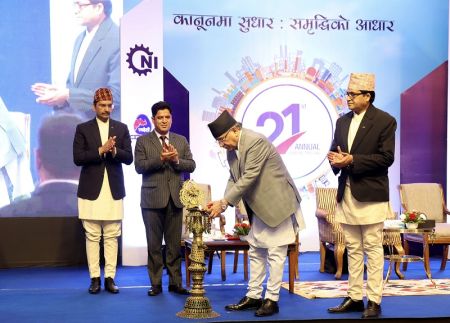The Covid-19 pandemic has become an existential threat to women-run businesses in Nepal. But some women entrepreneurs have started to do things in new ways to cope with the challenges.
Rajya Laxmi Shrestha, who has been operating Manakamana Dhaka Kapada Udhyog for the past 13 years, has not been able to deliver products worth Rs 10.5 million produced by her company. Shrestha is in a big dilemma over how to repay the bank loan that she took for her business.
Reshma Maharjan’s case is not different from that of Shrestha’s. Co-founder of Nature Craft, Maharjan used to sell products worth Rs 200,000 to Rs 300,000 monthly before the lockdown. She used to bring a type of grass from the Far-west region of Nepal and use them as raw materials to produce decorative items. Maharjan used to employ an all-female work for ceat her company. But with the lockdown, she had to shut down the business as all her workers have gone back to their villages.
“Even though all the raw materials are available in the country, we are not able to start our production as our stock has emptied,” she says. Despite production ceasing for the last three months, she needs to pay her workers and her rent. On top of that, the government’s decision to clear taxes has added extra pain to entrepreneurs like herself. Maharjan and Shrestha represent a vast number of women entrepreneurs in Nepal who are facing unprecedented challenges at present. Kamala Shrestha, chairperson of Women Entrepreneurship Development Committee under Federation of Nepalese Chambers of Commerce and Industry (FNCCI), says that businesswomen were already unaware of many aspects of business. They face challenges regarding access to finance and information, and lack of women-friendly banking services, among other issues. “Women entrepreneurs were only recently learning to stand independently. But the Covid-19 crisis has severely disrupted their education process,” mentions Shrestha.
According to Sharada Rijal, past president of Federation of Women Entrepreneurs of Nepal, the impact of the Covid-19 crisis will last long for businesswomen. “Our businesses have been shut down for nearly four months and its impact will last for at least a year,” she says. Talking about her own business, Rijal, who is the owner of United Nepal Felt Industries Pvt Ltd, adds, “Although we will still be able to deliver all our previous orders, I am sceptical about receiving new orders for some time now.”
Insufficient Relief
At first glance, the announcements made by Finance Minister Dr Yuba Raj Khatiwada during his budget for FY2020/21 seem quite encouraging to women entrepreneurs as most of them are involved in the cottage and small and medium enterprises (SMEs). The budget has provisioned measures including a 50 billion fund and loans at 5 percent interest rate to support the crisis-stricken SMEs. However, there is still a sense of confusion prevailing over the procedures behind the government’s announcement. Reeta Simha, president of FWEAN says that the budget is welcoming, but at the same time, she expresses her reservations regarding the fact that the budget has to be translated into action. Maharjan echoes Simha and gives an example where the government in the past budget had decided to provide collateral-free loans up to Rs 1.5 million to women entrepreneurs. “While applying for the loan, banks refused my loan applications saying that the policy was yet to be implemented.” Kamala Shrestha also expressed similar views. “We have also seen many cases where the budget has been seized due to lack of planning, implementation and monitoring,” she says.
According to Department of Industries (DoI), 274,433 SMEs have been registered till the end of FY2074/75 creating more than 1.7 million employment opportunities. Studies have shown that the SME sector contributes 22 percent to the country’s GDP. Among all the SMEs, 60 percent of enterprises are owned and run by women entrepreneurs, according to the Federation of Small and Medium Enterprises Nepal (FSME- Nepal).
Looking For A Way Out
As neither the government not the private sector had imagined the economic scenario would become this precarious due to the pandemic, there was a lack of preparedness to cope with the looming crisis. But women entrepreneurs have now started to adapt to the changing situation. “Though we were not prepared earlier, we can now search for alternatives. We need to be innovative and focus on local markets,” expresses Kamala.
As the Covid-19 crisis continues to disrupt commercial activities, businesswomen are changing their business strategy. For instance, Rijal has begun moving her business online. Similarly, she has been maintaining social distancing and health safety rules at her workplace with the easing of the lockdown.
Similarly, Rajya Laxmi Shrestha has also opted to ‘work-from-home’ model whereby workers at her company can produce products at their homes. “We have started forming a group, training them and providing raw materials to make Dhaka products. Once they finish their work, we again go to their houses and collect the finished products,” she informs. As the sharp decline in demand and supply of products has barred Shrestha from paying her staff full salaries, she has at least ensured that her workers receive at least half their wages.
According to a recent UNDP report, women have been the most affected by this pandemic. Nepal Labor Force Survey 2017/18 also showed that 66.5 percent of women are working in the informal sector and as soon as the lockdown started, the informal sector was directly affected at first. It has been suggested that in order to cope with the magnitude of the current economic crisis, women-run industries and enterprises need to have a separate emergency fund. “But for women entrepreneurs who are into small scale businesses, it is next to impossible for them to have an emergency fund,” says Rijal.
A Glimmer of Hope
Some women entrepreneurs are trying to utilise the lockdown period and turn it into something fruitful. They are trying to search for other opportunities through online discussions. Simha informs how FWEAN has been organising zoom meetings providing online classes to businesswomen. “The protracted lockdown confined people within their houses for months and this has been depressing for many. So, we organised mindfulness training to women entrepreneurs for they might have been depressed and tensed up with the present situation,” she mentions.
According to her, more than 3,000 women entrepreneurs from 50 districts are associated with FWEAN and have been providing jobs to thousands of people. As all of them cannot be reached right away, she says that they are looking for ways to develop more infrastructure as it has become a necessity now.
“This crisis has shown the importance of an emergency fund, the role of government and alternative sources of the supply chain. If they were only focusing on export, now they need to start focusing on the domestic market and show an active online presence,” concludes Simha.






















